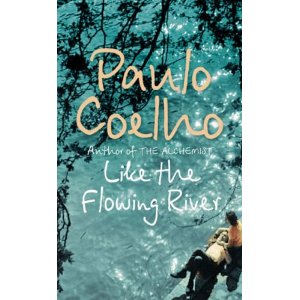I picked up a copy of
Paulo Coelho’s
Like the Flowing River today. It just happened that I opened it randomly in the centre to browse and get a sense of what I might be about to purchase. This is something I do when I browse books rather than rely on a back blurb or first few pages. I happened upon the following paragraph.
I had published, at my own expense, a book entitled The Archives of Hell [Hell’s Archives in other references] (of which I am very proud, but which is not currently available in bookshops simply because I have not yet found the courage to revise it). We all know how difficult it is to get published, but it is an even more complicated business getting your book into the shops. Every week, my wife would visit the bookshops in one part of the city, whilst I would go to another part to do the same thing.”
Now, I am by no means green about
Coelho, his books, his beliefs or his life, but even in light of the author’s willingness to allow many of his books to be freely downloadable online and a liberal attitude to file-sharing; I was somewhat surprised at the above admission. I hadn’t come across such a reference to Coelho ‘financing’ or self-publishing his work until now.
In reality, Coelho may have emerged into the mainstream publishing world in 1987 with The Pilgrimage, followed by publication of his seminal work,
The Alchemist, but both works in their native editions suffered from poor sales. The Alchemist, in its first print run in Brazil, only ever ran to 900 copies before it was sold on to a larger Brazilian publishing house. It was actually only after the publication of his third official book, Brida, in Brazil, and after those sales and eventual overseas rights were sold, led to worldwide success for the author. Most of the Coelho’s work was originally published in Portuguese in his native Brazil and predates—sometimes by several years—the English speaking worldwide editions. Coelho actually began writing song lyrics and some drama in his early days and had some input in the following published books:
The Limits of Resistance, tales. Ed Conservatory Theatre, 1970.
The Foundation for Krig-Ha. Raul Seixas, ed. Intersong, 1973.
The Theatre in Education. Ed Forense Universitária, 1974.
“The last book of this initial phase of Paulo Coelho, Hell Archives, is perhaps the most striking attempt to literary expression by the author in this phase. It is not strange, then, that has been published by Shogun Art, a publisher that had been created by the Paulo Coelho. The book that will mark the continuation of the career of Paulo Coelho and his entry into the space of the “culture of the borders” is the practical Manual of Vampirism, written by him and Liano Nelson Jr. and published by the ECO label Carioca. The publishing history of this book and the continuing writer’s career in the ECO provides examples of the strategic direction of the author in gaining an audience and change circuit which passes through his work.
In 1991, when the fame of Paulo Coelho in Brazil was still consolidating and fame abroad yet been announced, Martin Claret Publishers released a book called Himself by Paulo Coelho. The book was never reprinted since. Who knows why the revelations that have been brought to book, as well as fragments of Hell Archives and numerous short texts of Paulo Coelho that he never republished?”
Much of Coelho’s life seems spirited in intrigue and mysticism and even a reread of Juan Arias’ ‘Confessions of a Pilgrim’ doesn’t shed too much light on this , but then, I suspect, that is the magic and mystery Coelho will always leave us with.
It left with the thought tonight on the hokum tales of
John Grisham being a self-published author and
Jim Hines accurate take on it (it was his number one self-publishing story irk) Actually, Jim really lets fly on some of the top self-published hokum stories, but for now – John Grisham:
1. John Grisham self-published A TIME TO KILL. Actually, Grisham sold A TIME TO KILL to a small publisher, Wynwood Press, who did a 5000-copy print run. Grisham bought the remaindered copies, which he sold himself. While this is the sort of hard work self-publishing often involves, A TIME TO KILL was certainly not a self-published book.
It got me wondering:
(Early 1980’s – sleepy American town)
Young boy helps guy to sell guy out of the trunk of a car.
“Pop the trunk boy and I’ll open them boxes of books we got”
Boy opens trunk of car and steps back.
Guy takes knife and slices open boxes.
“You’re better with books than me – so, what we got today?”
Boy looks at content of boxes. [shrugs head]
“John Grisham and Paulo Coelho.”
The guy spits on the pavement.
“Ah, Jesus, a Mississippi do-gooder and a Brazilian hippie!”
“You gonna take a break, already, Pa?”
“Yeh, I’m gonna go for pancakes, boy. I’m gonna phone head office, too, and tell ‘em to just start sendin’ us bibles again!”

